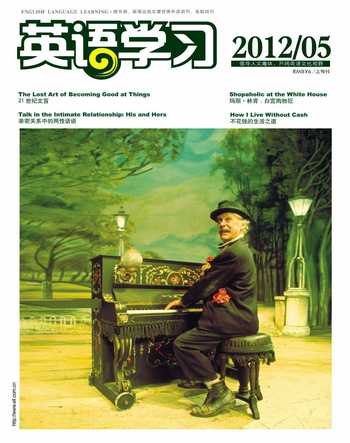親密關系中的兩性話語(節選)
Male-female conversation is cross-cultural communication. Culture is simply a network of habits and patterns gleaned from past experience, and women and men have different past experiences. From the time theyre born, theyre treated differently, talked to differently, and talk differently as a result. Boys and girls grow up in different worlds, even if they grow up in the same house. And as adults they travel in different worlds, reinforcing patterns established in childhood. These cultural differences include different expectations about the role of talk in relationships and how it fulfills that role.
Everyone knows that as a relationship becomes long-term, its terms change. But women and men often differ in how they expect them to change. Many women feel, “After all this time, you should know what I want without my telling you.” Many men feel, “After all this time, we should be able to tell each other what we want.”
These incongruent expectations capture one of the key differences between men and women. Communication is always a matter of balancing conflicting needs for involvement and independence. Being understood without saying what you mean gives a payoff in involvement, and that is why women value it so highly.
If you want to be understood without saying what you mean explicitly in words, you must convey meaning somewhere else–in how words are spoken, or by metamessages. Thus it stands to reason that women are often more attuned than men to the metamessages of talk. When women surmise meaning in this way, it seems mysterious to men, who call it “womens intuition” (if they think its right) or “reading things in” (if they think its wrong). Indeed, it could be wrong, since metamessages are not on record. And even if it is right, there is still the question of scale: How significant are the metamessages that are there?
Metamessages are a form of indirectness. Women are more likely to be indirect, and to try to reach agreement by negotiation. Another way to understand this preference is that negotiation allows a display of solidarity, which women prefer to the display of power (even though the aim may be the same–getting what you want). Unfortunately, power and solidarity are bought with the same currency: Ways of talking intended to create solidarity have the simultaneous effect of framing power differences. When they think theyre being nice, women often end up appearing deferential and unsure of themselves or of what they want.
When styles differ, misunderstandings are always rife. As their different styles create misunderstandings, women and men try to clear them up by talking things out. These pitfalls are compounded in talks between men and women because they have different ways of going about talking things out, and different assumptions about the significance of going about it.
Why are women more attuned to metamessages? Because they are more focused on involvement, that is, on relationships among people, and it is through metamessages that relationships among people are established and maintained. If you want to take the temperature and check the vital signs of a relationship, the barometers to check are its metamessages: what is said and how.
Everyone can see these signals, but whether or not we pay attention to them is another matter–a matter of being sensitized. Once you are sensitized, you cant roll your antennae back in; theyre stuck in the extended position.
兩性之間的交流是跨文化交流。文化無非是由經驗產生的習慣與模式組成的一套系統,而女人和男人有著不同的經驗。甫一出生他們就享有不同的待遇,聽不同的話語,結果就形成了不同的表達方式。男孩和女孩是在不同的環境當中成長起來的,哪怕他們同在一個屋檐下生活。長成以后他們也是各行其是,從而強化了他們童年養成的行為模式。這些文化差異包括,對交往中的話語角色及其如何履行這一角色,人們有不同的期待。
我們都知道,當一種長期關系得以確立以后,彼此的要求也會隨之發生變化,但女人與男人對變化的方式總是有不同的期待。許多女人覺得,“相處了這么長時間,我不說你也應該知道我需要什么。”而許多男人卻認為,“相處了這么長時間,我們完全可以告訴對方我們需要什么。”
這類不協調的期待恰好說明了男女之間的一個關鍵差異。交流永遠都是對參與和獨立的矛盾訴求進行調和的一種努力。“不言而喻”是對參與的回報,這就是為什么女人十分看重這一點。
假如你希望無需清晰的表述就能夠得到理解,你就必須通過別的途徑傳達你的用意,比如變換表述方式,或代之以言外之意。所以女人比男人更適應交談中的言外之意,就是順理成章的事情了。當女人用這種方式來測度某種含義的時候,男人會覺得不可思議,把它稱作“女人的直覺”(如果他們認同的話),或“異想天開”(如果他們不認同的話)。的確,她們的推測有可能出錯,因為言外之意并沒有記錄在案。即便她們猜對了,還有一個適用范圍的問題:言外之意在這里有多大的作用?
言外之意是一種間接的表達方式。女人更愿意選擇這種方式,更希望通過協商達成一致。理解這種偏好的另外一個角度是,相比于權力的展示,女人更傾向于協商所認可的團結精神(即便目的或許相同:都是為了謀求所需)。不幸的是,權力與團結不可兼得:營造團結的表達方式,同時也會影響到權力差別的形成。當她們認為自己在釋放善意的時候,她們常常表現為唯唯諾諾、缺乏自信或無所適從。
方式有異,誤會也就在所難免。兩性間因不同的方式產生誤會時,就會嘗試通過交心懇談來消除它。但在男人與女人的對話中這些問題會變得更加復雜,因為在交心懇談中他們有不同的表達方式,對其意義也有不同的理解。
為什么女人更適應言外之意呢?因為她們更看重參與,也就是更看重人與人之間的關系;正是通過言外之意,人與人之間的各種關系才得以建立和維持。如果你想測試一下某一關系的冷暖及其關鍵征兆,言外之意就是你的晴雨表:即表達什么和如何表達。
每個人都能看到這些信號,但是否留意則是另一回事,要看你是否敏感。而一旦你變得敏感起來,就再也不會收起你的觸角,它們將保持伸展的姿態。

